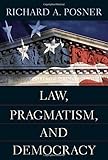Law, Pragmatism, and Democracy / Richard A. Posner.
Material type: TextPublisher: Cambridge, MA : Harvard University Press, [2009]Copyright date: 2005Description: 1 online resource (416 p.)Content type:
TextPublisher: Cambridge, MA : Harvard University Press, [2009]Copyright date: 2005Description: 1 online resource (416 p.)Content type: - 9780674042292
- 340/.11 21
- KF384 .P67 2003
- online - DeGruyter
| Item type | Current library | Call number | URL | Status | Notes | Barcode | |
|---|---|---|---|---|---|---|---|
 eBook
eBook
|
Biblioteca "Angelicum" Pont. Univ. S.Tommaso d'Aquino Nuvola online | online - DeGruyter (Browse shelf(Opens below)) | Online access | Not for loan (Accesso limitato) | Accesso per gli utenti autorizzati / Access for authorized users | (dgr)9780674042292 |
Browsing Biblioteca "Angelicum" Pont. Univ. S.Tommaso d'Aquino shelves, Shelving location: Nuvola online Close shelf browser (Hides shelf browser)

|

|

|

|

|

|

|
||
| online - DeGruyter The Federal Courts : Challenge and Reform, Revised Edition / | online - DeGruyter Sex and Reason / | online - DeGruyter Public Intellectuals : A Study of Decline, With a New Preface and Epilogue / | online - DeGruyter Law, Pragmatism, and Democracy / | online - DeGruyter Law and Social Norms / | online - DeGruyter An Affair of State : The Investigation, Impeachment, and Trial of President Clinton / | online - DeGruyter Color and Culture : Black Writers and the Making of the Modern Intellectual / |
Frontmatter -- Contents -- Preface -- Introduction: Pragmatic Liberalism and the Plan of the Book -- CHAPTER ONE. Pragmatism: Philosophical versus Everyday -- CHAPTER TWO. Legal Pragmatism -- CHAPTER THREE. John Dewey on Democracy and Law -- CHAPTER FOUR. Two Concepts of Democracy -- CHAPTER FIVE. Democracy Defended -- CHAPTER SIX. The Concepts Applied -- CHAPTER SEVEN. Kelsen versus Hayek: Pragmatism, Economics, and Democracy -- CHAPTER EIGHT. Legality and Necessity -- CHAPTER NINE. Pragmatic Adjudication: The Case of Bush v. Gore -- CHAPTER TEN. Purposes versus Consequences in First Amendment Analysis -- Conclusion -- Index
restricted access online access with authorization star
http://purl.org/coar/access_right/c_16ec
A liberal state is a representative democracy constrained by the rule of law. Richard Posner argues for a conception of the liberal state based on pragmatic theories of government. He views the actions of elected officials as guided by interests rather than by reason and the decisions of judges by discretion rather than by rules. He emphasizes the institutional and material, rather than moral and deliberative, factors in democratic decision making.Posner argues that democracy is best viewed as a competition for power by means of regular elections. Citizens should not be expected to play a significant role in making complex public policy regarding, say, taxes or missile defense. The great advantage of democracy is not that it is the rule of the wise or the good but that it enables stability and orderly succession in government and limits the tendency of rulers to enrich or empower themselves to the disadvantage of the public. Posner’s theory steers between political theorists’ concept of deliberative democracy on the left and economists’ public-choice theory on the right. It makes a significant contribution to the theory of democracy—and to the theory of law as well, by showing that the principles that inform Schumpeterian democratic theory also inform the theory and practice of adjudication. The book argues for law and democracy as twin halves of a pragmatic theory of American government.
Mode of access: Internet via World Wide Web.
In English.
Description based on online resource; title from PDF title page (publisher's Web site, viewed 26. Aug 2024)


